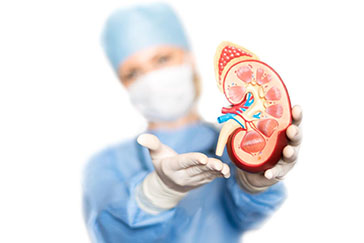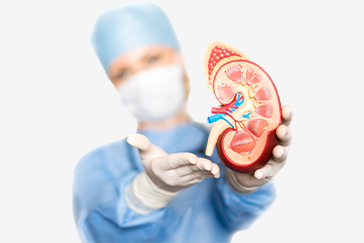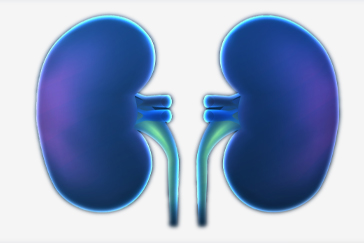 Book Appt.
Book Appt.
 Call Now
Call Now


PKD, or Polycystic Kidney Disease, is a type of genetic/inherited disorder marked by the development of a cluster of cysts in the kidneys, leading to an abnormal increase in their size. Over a period, this results in the gradual loss of kidney function, giving rise to severe complications, including kidney failure. Unlike tumours, which are solid masses or lumps, these are tiny fluid-filled sacs that tend to grow very large. The severity of the condition varies from one patient to another; in some cases, it can even result in the development of cysts in the liver.
What are the different types of Polycystic Kidney Disease?
Polycystic kidney disease is broadly classified into two types based on the onset of the symptoms and their progression.
What causes Polycystic Kidney Disease?
Polycystic Kidney Disease is passed from the parents to their children, i.e. it is an inherited disorder. This happens when one of the two parents, or both of them, passes on the defective gene that is responsible for it. The former is known as dominant inheritance, and the latter is called recessive inheritance.
What are the symptoms of Polycystic Kidney Disease?
Various symptoms that could be an indication of polycystic kidney disease include:
SHALBY Sanar International Hospitals provides extensive medical procedures backed up with our state-of-the-art technology and a team of highly qualified & experienced clinical experts.

Patient from Indonesia gets Kidney Transplant | SHALBY Sanar Interntional Hospitals

Patient from Indonesia gets Kidney Transplant | SHALBY Sanar Interntional Hospitals

Successful Kidney Transplant of a patient by Dr Amit Kumar

Successful Live Renal Allograft Transplant: Mr. Zaid's Journey to Recovery by Dr Amit Kumar Yadav

Life Renewed: Mr. Evans Elieza Aveva's Remarkable Kidney Transplant Journey

A successful Kidney Transplant gives Mr. Tache from Ethiopia, a new beginning

Successful story of kidney transplant I #kidneytransplant #patient testimonial
Our doctors pen down their research findings and experiences from time to time. Their words provide deep insight into the latest techniques, technologies and other advancements in healthcare. It provides expert answers to all kinds of health questions for real-life issues.
VIEW ALL




Since the day of its foundation, SHALBY Sanar International Hospitals is committed to provide comprehensive healthcare services. It regularly organizes awareness programs in its premises and encourages outdoor healthcare activities and camps with an intent to put focus on preventive healthcare.
VIEW ALL